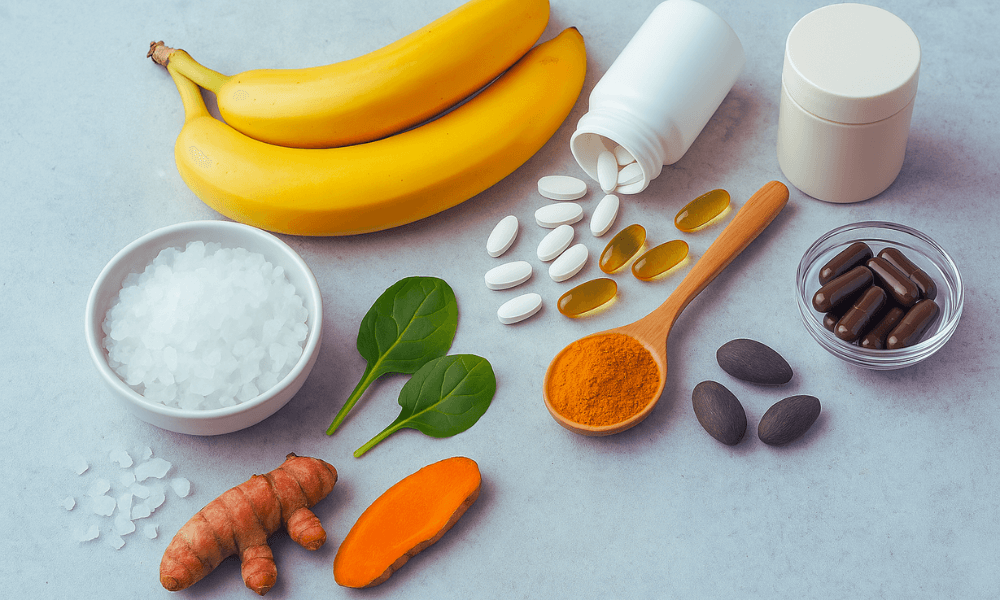Loosen Up: What Should I Take for Muscle Stiffness? Muscle stiffness is one of those nagging discomforts that can sneak up after a workout, a long day at work, or even while sleeping in an awkward position. You stretch, you twist, you massage, but the stiffness clings on. So, what should I take to finally find relief from muscle stiffness? This comprehensive guide walks you through the best options—natural remedies, over-the-counter aids, lifestyle habits, and even supplements—to help you regain flexibility and comfort.

What Should I Take for Muscle Stiffness? Natural Remedies That Work
When asking “what should I take for muscle stiffness,” natural remedies are often a safe and effective place to start. The body responds well to gentle, holistic treatments that support healing without harsh side effects.
1. Magnesium-Rich Foods or Supplements
Magnesium plays a vital role in muscle relaxation. Foods like bananas, spinach, almonds, and avocados are great natural sources. For more concentrated relief, a magnesium supplement—especially magnesium glycinate—can help reduce muscle cramps and stiffness.
2. Turmeric and Curcumin
Turmeric, with its anti-inflammatory compound curcumin, is a powerhouse for relieving soreness. You can take it in capsule form or mix turmeric powder into a warm milk drink. Many people find this helpful when asking themselves “what should I take for muscle stiffness that also works on inflammation?”
3. Epsom Salt Baths
Soaking in a warm Epsom salt bath allows your body to absorb magnesium through the skin. It not only relaxes tight muscles but also calms the mind—a dual remedy for physical and mental tension.
Top Over-the-Counter Choices: What Should I Take for Muscle Stiffness Fast?
If you’re looking for quick relief, over-the-counter (OTC) options offer convenience and effectiveness. When you’re in a rush to relieve pain, these are often the go-to answers for “what should I take for muscle stiffness.”
1. Nonsteroidal Anti-Inflammatory Drugs (NSAIDs)
Ibuprofen or naproxen sodium can reduce inflammation and pain. While not a long-term solution, they’re very effective for sudden stiffness after overexertion or injury.
2. Topical Analgesics
Creams or gels containing menthol, capsaicin, or salicylates can be applied directly to the sore area. Products like Biofreeze or Tiger Balm deliver temporary relief without needing to ingest anything.
3. Muscle Relaxants (Short-Term Use)
Doctors sometimes prescribe muscle relaxants like cyclobenzaprine for acute stiffness. However, these are best used in moderation due to potential side effects like drowsiness and dependency.
Supplements to Consider: What Should I Take for Muscle Stiffness Long-Term?
For those dealing with recurring or chronic stiffness, adding certain supplements to your daily regimen can be a game-changer. They support muscle function, reduce inflammation, and may even help prevent stiffness before it starts.
1. Vitamin D
Low vitamin D levels are linked to muscle pain and stiffness. Sunlight helps, but a supplement might be necessary, especially in colder months or cloudy regions.
2. Omega-3 Fatty Acids
Fish oil supplements help reduce systemic inflammation. Omega-3s support joint health and can reduce delayed-onset muscle soreness (DOMS).
3. Collagen + Vitamin C
These two go hand-in-hand for muscle and joint repair. Collagen provides structural support, while Vitamin C boosts collagen synthesis and fights oxidative stress.
What Should I Take for Muscle Stiffness from Exercise or Overtraining?
Stiff muscles after working out is common, but you shouldn’t have to suffer through it. Here’s what athletes and fitness lovers take for faster recovery.
1. Branched-Chain Amino Acids (BCAAs)
These essential amino acids help reduce muscle damage and accelerate repair. If you’re wondering “what should I take for muscle stiffness that supports workout recovery,” BCAAs are a great answer.
2. Tart Cherry Juice
This antioxidant-rich drink has been shown to reduce muscle soreness and inflammation in athletes. It’s a natural way to ease post-exercise pain.
3. Protein Shakes
Muscles need protein to rebuild. A shake within 30 minutes of your workout helps reduce stiffness the next day.
What Should I Take for Muscle Stiffness Due to Stress or Poor Posture?
Not all stiffness comes from exercise—sometimes it’s your desk job, stress, or even your sleep habits. So, what should I take for muscle stiffness when it stems from lifestyle factors?
1. Adaptogens like Ashwagandha
Chronic stress can cause muscle tension. Ashwagandha helps balance cortisol levels, improving relaxation and muscle recovery.
2. CBD Oil or Gummies
CBD has grown in popularity for managing pain, tension, and anxiety. It may help calm an overactive nervous system and relax tight muscles.
3. Herbal Teas (Chamomile, Ginger, Peppermint)
These teas offer mild muscle relaxation, soothe the gut, and help with sleep. They’re gentle but surprisingly effective for tension-related stiffness.
Lifestyle Tweaks to Support Your Recovery
Beyond asking “what should I take for muscle stiffness,” it’s important to support recovery with smart habits. Your daily routine can either help or hinder healing.
1. Stay Hydrated
Dehydration can cause cramping and stiffness. Aim for at least 8 glasses of water a day, more if you’re active.
2. Stretching and Mobility Work
Daily stretching, yoga, or foam rolling helps improve circulation and reduce muscle tightness. Even 10 minutes can make a difference.
3. Proper Sleep
Muscles repair and regenerate during deep sleep. Aim for 7–9 hours of quality rest each night to help your body bounce back.
When Should You See a Doctor?
If stiffness is severe, persistent, or affects your ability to move, it’s worth seeing a healthcare provider. Chronic muscle stiffness could be a sign of underlying issues like:
- Fibromyalgia
- Myofascial pain syndrome
- Rheumatoid arthritis
- Electrolyte imbalances
Getting a proper diagnosis ensures you’re treating the root cause, not just the symptom.
Final Thoughts: So, What Should I Take for Muscle Stiffness?
If you’re still wondering, “what should I take for muscle stiffness,” here’s a quick summary to guide your next steps:
- Natural remedies like magnesium, turmeric, and Epsom salt are gentle and effective.
- OTC solutions provide fast, convenient relief.
- Supplements such as vitamin D, BCAAs, and omega-3s offer long-term support.
- Lifestyle habits like stretching, hydration, and quality sleep speed up recovery.
Everyone’s body is different. What works for one person might not work for another, so don’t be afraid to try a combination of approaches to see what works best for you.
The next time muscle stiffness strikes, you’ll know exactly what to take—and how to bounce back faster.
